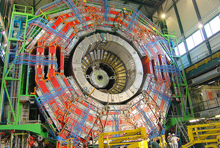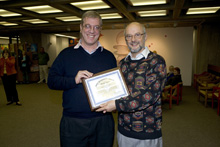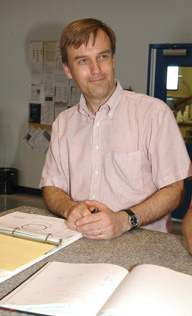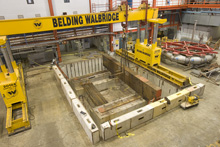 |
Wednesday, September 13, 2006 |
|
Wednesday, September 13
Thursday, September 14 Click here for a full calendar with links to additional information. |
|
Extended Forecast |
Secon Level 3 |
|
Wednesday, September 13 -Vegetable Beef -Fish & Chips -Almond Crusted Sole -Country Fried Steak w/Pepper Gravy -Beef & Cheddar Panini w/Sauteed Onions -Assorted Slice Pizza -Cavatappi Pasta w/Italian Sausage & Tomato Ragu |
|
Wednesday, September 13 Lunch -Lebanese Kabob w/Pita -Baba Ghannuj -Hummus -Tabbouli -Baklava
Thursday, September 14 |
| Fermilab Today is online at: http://www.fnal.gov/today/ Send comments and suggestions to today@fnal.gov Fermilab Today archive Hurricane Relief Page Fermilab Today PDF Version Fermilab Result of the Week archive Fermilab Safety Tip of the Week archive Linear Collider News archive Fermilab Today classifieds Subscribe/Unsubscribe to |
| Fermilab contributions help CMS magnet reach full field | |||
| |||
|
Fermilab scientists and collaborators of the US/CMS project have joined colleagues from around the world in announcing that the world's largest superconducting solenoid magnet has reached full field strength in tests at CERN, the European Particle Physics Laboratory.
Weighing in at more than 13,000 tons, the Compact Muon Solenoid experiment's magnet is built around a 20-foot-diameter, nearly 43-foot-long superconducting solenoid - a wire coil with multiple loops, which generates a magnetic field when electricity passes through it. The CMS solenoid generates a magnetic field of 4 Tesla, some 100,000 times stronger than the Earth's magnetic field, and stores 2.5 gigajoules of energy, enough to melt nearly 20 tons of gold. Superconductivity is achieved by chilling the coil to a temperature near absolute zero, where virtually all electrical resistance vanishes. Extremely high electrical current can then be used to generate a powerful magnetic field.
|
| Send in Director's Award nominations before Sept. 25 | |||
| |||
|
Whether they are meeting with students and teachers to explain what Fermilab is all about, or designing, building and maintaining Lederman Science exhibits, volunteers are a major asset to the K-12 students and teachers in Fermilab's education programs. Now is the time to nominate a volunteer that you think has made the largest contribution to this effort.
To submit a nomination, download a nomination form or pick one up from Nancy Lanning, WH15W. Forms must be received by Monday, September 25, to be considered for the 2006 award. Nominees must be a Fermilab staff member, user or contractor. Nominations will be held for two consecutive years. From the nominations, a selection committee will chose a winner. Director Pier Odonne will present the winner with an award of $1000, made possible by an anonymous donor, on Monday, October 16, at 5:00 p.m. on the second floor crossover. |
|
ZeeNews.com, September 9, 2006: Giant machine set to probe secrets of the universe Deep underground on the Franco-Swiss border someone will throw a switch next year to start one of the most ambitious experiments in history, probing the secrets of the universe and possibly finding new dimensions. The Large Hadron Collider -- a 27-kilometre long circular particle accelerator -- at the Cern experimental facility near Geneva will smash protons into each other at unimaginable speeds trying to replicate in miniature the events of the big bang.
''These beams will have the kinetic energy of an aircraft carrier slammed into the size of a zero on a 20 pence piece,'' Brian Cox of Manchester University told the annual meeting of the British Association for the Advancement of Science.
|
| Paths to understanding | ||
In today's issue, Particle Physics Division Head Jim Strait discusses the importance of internationalism for physics, and for the world.
This free flow of ideas and people is not only crucial for the advancement of our science, but also, in a small way, helps advance understanding among the diverse cultures of the world by giving ourselves and those around us small glimpses of how other people live and think. This was particularly true during the Cold War, when high energy physicists were among the few who traveled between the Soviet bloc and the West. But it is also true and important now, when understanding between the US and much of the rest of the world is lacking. I hope that our international ways, and our values of openness and inclusiveness, can continue to flourish, and that they can help, at least a little, to defuse tensions in the world. So let's keep on traveling! |
|
|
Special Theory Seminar Today Today at 2:30 p.m. Arvind Rajaraman of UC Irvine will give a talk titled "SuperWIMP Dark Matter" in the Theory Conference Room, WH3E. He will discuss a new model for dark matter in which the dark matter particles are produced from a decay of weakly interacting particles.
Tour and lecture at Waubonsee tonight
|



